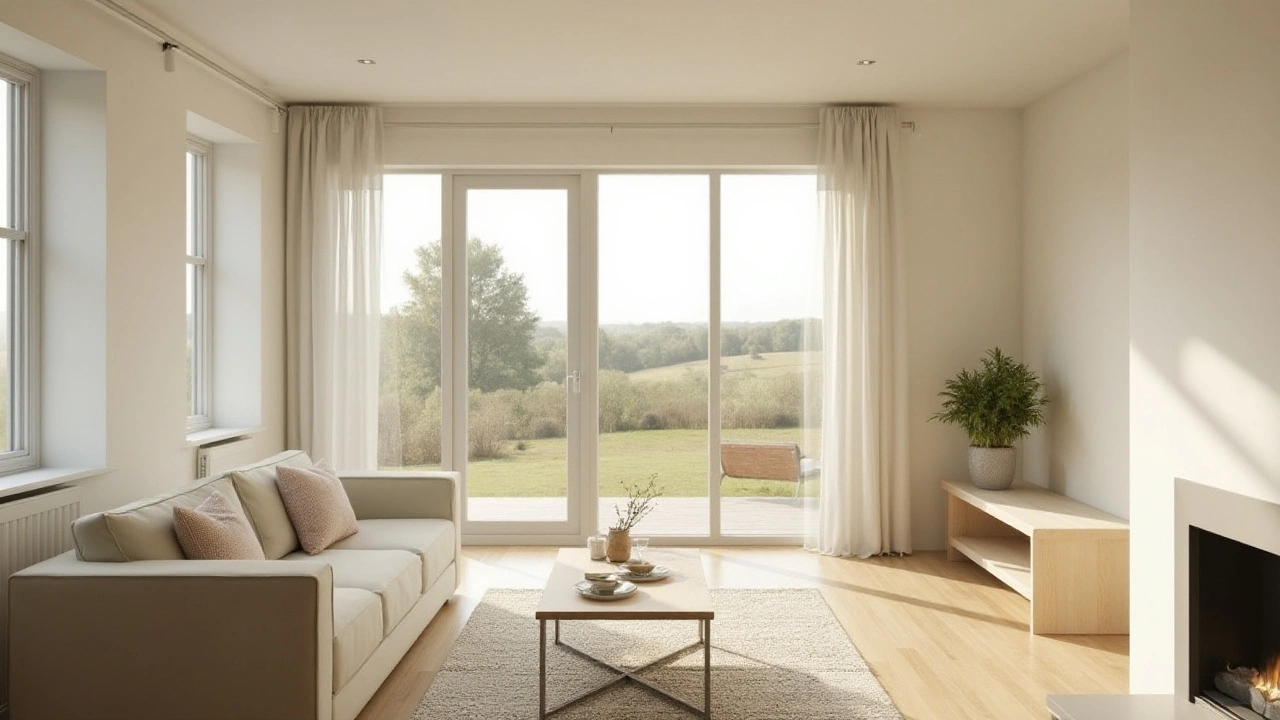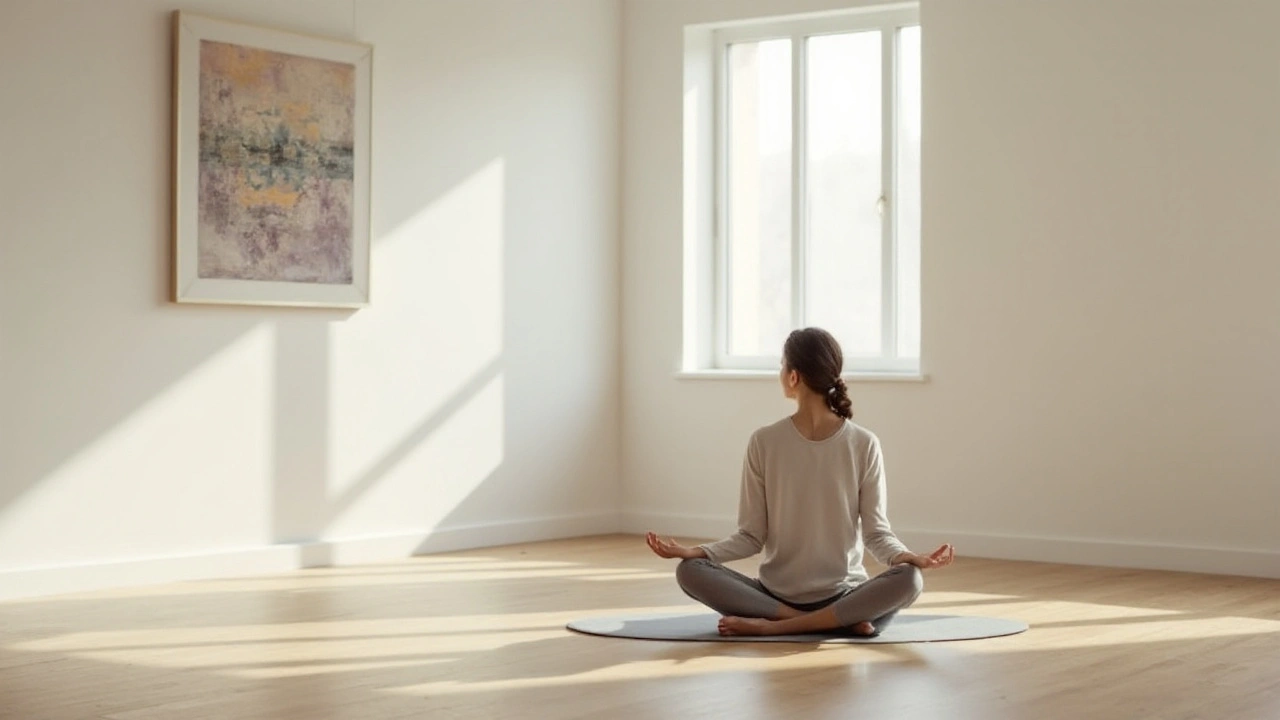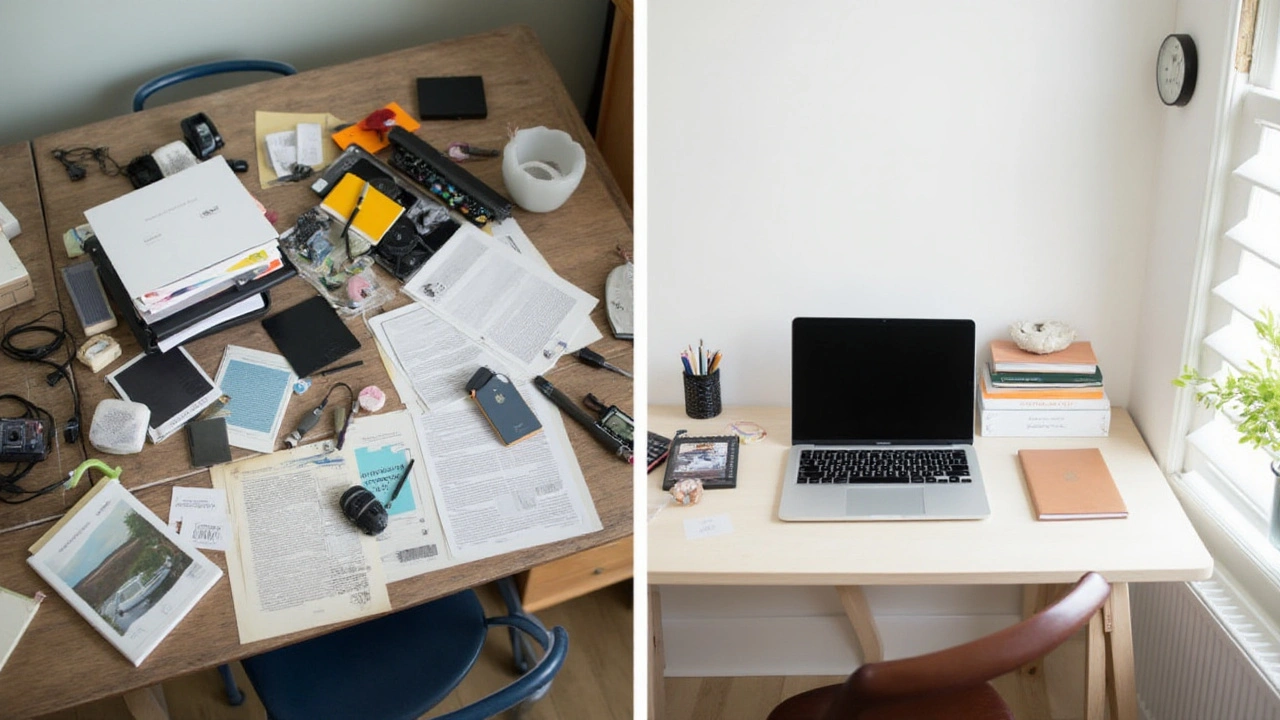Discovering Balance through Minimalism: An Insightful Guide
 Oct, 19 2024
Oct, 19 2024
In today's fast-paced world, where many of us face constant bombardment with information and possessions, achieving balance can feel like an uphill battle. All too easily, our lives become cluttered - both physically and mentally - leading to stress and distraction.
This is where minimalism steps in, offering a refreshing alternative. It's not just emptying your shelves or reducing what you own, but fostering a mindset that values quality over quantity and intentionality over accumulation.
Whether you wish to lead a more peaceful existence or seek clarity in your daily choices, minimalism provides the tools to cut through the chaos. Join us as we explore how paring down to the essentials can help us focus on what truly matters, paving the way for a life of balance and purpose.
- Understanding Minimalism
- Benefits of a Minimalist Lifestyle
- Steps to Start Your Minimalist Journey
- Minimalism Beyond Physical Possessions
- Challenges and Solutions in Maintaining a Minimalist Lifestyle
Understanding Minimalism
Minimalism is often misunderstood as simply the act of reducing physical possessions. While decluttering is a part of it, the essence of minimalism runs much deeper. At its core, it is about intentionally focusing on what truly adds value to your life and letting go of the excess that doesn't contribute to your well-being. Compassion, mindfulness, and a sense of purpose are key elements of this lifestyle, which encourages individuals to assess their relationships, habits, and even thoughts, alongside their material belongings.
The roots of minimalism can be traced back to various cultural and philosophical traditions. From the simplicity preached by Buddhist teachings to the Stoic philosophies of ancient Greece that advocate for moderation and virtue, the concept of living simply has been inspiring people across different eras and geographies. Authors such as Marie Kondo in her widely read book "The Life-Changing Magic of Tidying Up" have made minimalism accessible to a modern audience, teaching them to keep only those items that "spark joy."
Living a minimalist lifestyle isn't about deprivation, but about freedom. Freedom from the unnecessary and unneeded, allowing more space for meaningful experiences and pursuits. It's a call to step back from consumer culture, which often equates joy and success with accumulation. Research by psychologist Dr. Thomas Gilovich from Cornell University supports this, showing that people often derive more happiness from experiences than from physical goods.
"Simplicity is the ultimate sophistication." - Leonardo da Vinci
One of the practical ways to embrace minimalism is by starting small. You don't need to overhaul your entire life overnight. Instead, begin with one area, such as your closet or your schedule, and apply the principles of minimalism there. Ask yourself what items or activities genuinely enrich your life. If something doesn't, consider why you hold on to it. This act of conscious decision-making is at the heart of minimalism.
It's also important to recognize that minimalism looks different for everyone. What might be an ideal decluttered space for one might feel stark and empty for another. The beauty of minimalism lies in its flexibility and personal nature. It's not about achieving an Instagram-perfect look, but about crafting a life that feels right for you. There are no strict rules; the only guiding principle is intentionality. As you continue to explore minimalism, remember to be patient with yourself. Change takes time, and gradually, your life will begin to reflect the balance and simplicity you seek.
Benefits of a Minimalist Lifestyle
Minimalism offers a transformative path to living with intention and clarity, where practicality takes precedence over excess. Adopting this lifestyle can lead to a host of benefits that go beyond mere aesthetics or organization. At its core, minimalism champions the idea that less is more, allowing you to focus on what truly brings value to your life. By removing unnecessary items and commitments, you create space—both physical and mental—for things that genuinely matter, helping to breed focus and a more profound sense of satisfaction. The minimalist journey encourages us to prioritize our time, energy, and resources on activities and values that align with our deepest desires.
People who embrace minimalism often report feeling a sense of freedom and creativity that they haven't experienced before. With fewer distractions, they can direct their attention to their passions and goals. Interestingly, studies suggest that individuals living minimally tend to experience lower stress levels and better mental health. The avalanche of choices demanded by consumer culture can overwhelm the most organized among us, leading to decision fatigue. By simplifying our surroundings and choices, we reduce sources of tension, which promotes mental well-being. Indeed, as the noted architect Ludwig Mies van der Rohe once noted, "Less is more," capturing the spirit of how minimalism empowers individuals to simplify and clarify their lives.
In addition to enhancing personal well-being, a minimalist lifestyle can substantially benefit our surroundings by promoting a sustainable environment. Consciously consuming fewer resources not only conserves energy but also lessens waste. The choices you make in favor of simplicity can lead to a reduced carbon footprint. The ripple effect extends to our communities and the planet, embracing sustainability. A table from the Environmental Protection Agency showcases how recycling and lesser consumption contribute significantly to a decline in landfill use, reflecting the powerful impact of these choices on global scales.
| Recycling | Landfill Reduction |
|---|---|
| 25% | 12 million tons less annually |
| 50% | 24 million tons less annually |
Minimalism isn’t just a trend; it’s a path to richer life experiences, inviting us to shift our perspective from accumulation to appreciation. As you begin to welcome minimalism into different areas such as your home, schedule, and diet, you will likely notice an uptick in your sense of gratitude and contentment. The beauty of this journey is its focus on enhancing quality of life by valuing experiences over material possessions. This recalibration helps forge deeper connections with others and ourselves, leading to a harmony that is often elusive in fast-paced modern living.

Steps to Start Your Minimalist Journey
Embarking on a minimalist journey can seem daunting at first, yet it often begins with a single step: awareness. Start by looking around you, and recognizing just how much stuff fills your space. A cluttered room can sometimes mirror a cluttered mind, but once you awaken to the possibilities of minimalism, the path becomes clearer. Have a look at each item and ask yourself, does this add value to my life or is it merely taking up space? This is the core of minimalism – not deprivation, but choice and purpose. Begin by making a list of all the significant areas in your home that demand decluttering, then tackle them one at a time, focusing only on what truly serves your goals and happiness.
Before diving deep into decluttering, it can be helpful to define what minimalism means to you. It isn't a one-size-fits-all practice. For some, it's about creating a simpler lifestyle; for others, it's prioritizing mental clarity over material goods. As you mold your own interpretation, remember that it's okay to move gradually. Start with something manageable—perhaps your wardrobe. Keep only clothes that fit well and reflect your style, ensuring that when you open your closet each morning, you're greeted with items that make you feel good. As decluttering clothes, consider this powerful idea often shared by minimalist enthusiasts: "The things you own end up owning you."
"The first step in crafting the life you want is to get rid of everything you don’t." – Joshua Becker
After you've tackled your wardrobe, you might want to move on to more communal spaces, like your living room or kitchen. Here, observe how many items are actually used regularly and which ones are just gathering dust. Reduce excess cutlery, gadgets, and trinkets, and you'll find your environment feeling lighter already. For some people, letting go of sentimental items can be the hardest part. In such cases, opt for keeping one or two significant pieces that bring joy or tell a story, and let go of the rest with gratitude.
As you continue on your journey, digital decluttering is another crucial step. This means organizing your digital life — from cleaning up your inbox to sorting files and deleting unused apps on your phone. Our mental spaces can become just as crowded as our physical ones, and a minimal digital environment can provide clarity and efficiency. Consider using a cloud storage service to maintain important documents and photos. Make it a habit to regularly clear your digital space, which can significantly impact your daily routine, making it smoother and more enjoyable.
The minimalist journey isn't just about removing items; it's also about reevaluating how we spend our time and energy. Start scheduling regular digital detox periods, embrace activities that contribute to personal growth, and savor moments of relaxation and reflection. By incorporating minimalist principles into how you manage your day-to-day life, you create a rhythm that feels more aligned with your values. Remember, everyday decisions shape the quality of your life, and through these steps, you can craft a more balanced, intentional, and fulfilling way of living.
Minimalism Beyond Physical Possessions
Embracing minimalism often begins with the excitement of decluttering physical spaces, clearing closets, and tidying garages. But the practice of minimalism offers deeper rewards beyond just a neatly organized bookshelf. Greater peace and life satisfaction await those willing to look past material things and focus on achieving simplicity in their everyday interactions and thoughts. Many people find that the true value of a minimalist lifestyle lies in prioritizing relationships, mindfulness, and intrinsic values over accumulating 'stuff'. By setting clear boundaries and focusing on personal fulfillment, minimalist living enriches lives far beyond the immediate sphere of material possessions.
The idea that less is more in a non-material sense follows naturally after one has minimized physical possessions. It involves cultivating a conscious awareness that allows for saying 'no' to obligations and pressures that don’t align with personal goals. Consider someone overburdened with commitments. By choosing minimalism, they might free themselves from obligatory gatherings or activities that drain their energy without meaningful contribution to their life's purpose. In place of such commitments, fostering deeper, more intentional bonds with fewer people can lead to a more fulfilling social experience.
Mindfulness can be a powerful ally in living minimally beyond possessions. Allowing oneself the time to pause and reflect can open a realm of possibilities for living a full, uncluttered life. In this age of digital overload, the practice of digital detoxing—turning off notifications, limiting screen time, and unfollowing accounts that clutter your mental space—mirrors the process of reducing tangible clutter. People who embrace digital minimalism find themselves with more time to delve into activities that truly nourish their minds and souls.
An inspiring example can be found in the words of Joshua Becker, author of 'The Minimalist Home':
“The first step in crafting the life you want is to get rid of everything you don’t.”By understanding that true minimalism involves shedding anything that doesn’t add value to your life—be it tangible or intangible– we create room for experiences, thoughts, and people who bring sincere joy and fulfillment. This transformation ultimately harmonizes the balance between minimalism and well-being, reconnecting us with what truly matters.

Challenges and Solutions in Maintaining a Minimalist Lifestyle
Embracing minimalism often feels liberating at the start, like a fresh breath of air after a deep clean. But keeping up with it over the long term can bring its own set of hurdles. One of the primary challenges is staying consistent in a world that's always encouraging more. Temptations to buy new things are everywhere, from flashy advertisements to the social pressure of keeping up with trends. It can be quite taxing to resist these constant nudges toward more possessions. There can also be moments of doubt where you miss the comfort or excitement that material items used to bring to your life. It's crucial to remind oneself of the purpose behind minimalism, such as reducing stress and improving focus.
Adapting to a minimalist lifestyle might move you away from conventional norms, inviting skepticism from friends or family who may not understand your choices. At every gathering or while catching up on social media, you may face questions or assumptions about reduced spending equating to lack of success or ambition. Maintaining your resolve in such situations demands inner strength and fortitude. Using tools and methods to reinforce your reasons for choosing minimalism, perhaps by keeping a journal or regularly reflecting on the mental clarity it offers, can help.
"The more you have, the more you are occupied. The less you have, the more free you are," shared Mother Teresa, perfectly capturing the essence of minimalism.
One method to overcome these challenges is by creating a strong community of like-minded individuals. This network can offer support, share inspiration, and swap tips for leading such a life. It requires finding environments both online and offline where minimalism is celebrated and understood. Surrounding yourself with people who appreciate this lifestyle can make it much easier to remain disciplined. Another effective approach is establishing a clear set of personal guidelines for purchases—consider adopting the 'one in, one out' rule, where you only buy something new when you're willing to let go of an old item. This practice helps maintain balance and avoids clutter creeping back in.
If you find yourself struggling with specific aspects, identify whether those challenges are linked to a lack of emotional support for this lifestyle choice. Recognizing emotional triggers that make you want to buy or hoard can be an insightful exercise. Additionally, engaging with content like books or podcasts centered around minimalism might offer fresh perspectives and bring you back on track. Practicing gratitude for what you do own over focusing on what's missing helps maintain a positive outlook. Finding joy in experiences rather than material goods can cement the shift in mindset, enabling you to find solace and contentment in the minimalist journey.